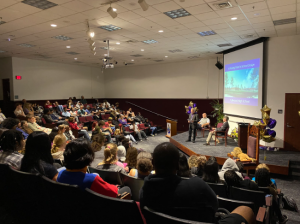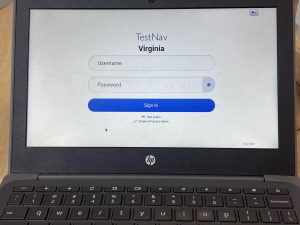Hispanic Heritage Month an Opportunity to Re-Think how we Teach History
October 1, 2017
Hispanic Heritage month does not fulfill its purpose of a month to celebrate the heritage of Hispanic Americans. The term Hispanic is exclusive to many demographics in Latin America. Dedicating a mere month to Hispanic people is not enough to account for all of their feats in American history. Hispanic Heritage month is problematic for promoting white superiority in the United States.
By setting aside just one month to Latinx people does not account enough for the achievements and triumphs they’ve experienced. We should be taught the diverse history of the United States, not just of what white Europeans have done to impact this country. The American public school system is whitewashed. In elementary school, I remember the first time learning about something vaguely about my heritage. Christopher Columbus sailed the ocean blue in 1492. A simple harmless nursery rhyme at the time. My schooling up until I came to the Global Studies and World Languages Academy at Tallwood drew me a picture of the European colonizers happily eating alongside the mis-termed “Indians” at Thanksgiving.
This white savior complex is harmful to brown communities. Young, brown people maintain the mindset that they cannot account to as much as their white peers can in life. The way we teach American history in this country keeps white people in power by not teaching about Latinx revolutionaries in school. Latinx students need to learn more about, and thus be inspired by, their cultural heroes.
The word ‘Hispanic’ was created by the Census Bureau, in the 1970s, for the influx of Mexican, Cuban, and Puerto Rican immigrants to identify with. This word is often interchanged with the term ‘Latino.’ Hispanic is defined as a person from a Spanish speaking country. Latino/a is defined as a person from or origin of a Latin American country. I believe the title of Hispanic Heritage month is exclusive to many people who share similar identities to ‘Hispanics.’
The term Latinx would be inclusive to the demographics under this umbrella of identities categorized as solely Hispanic. Additionally, Latinx was created for individuals who do not fit into the female/male gender binary. Replacing Hispanic with Latinx would be a much more inclusive identity for everyone, including individuals who do fit into the gender binary. ‘Latinx’ also deprives the Spanish grammatical rules by replacing the letters ‘a’ or ‘o’ with an ‘x’. The word also signifies as an identifier for indigenous or mestizo communities to separate themselves from post-colonial influence by breaking the grammatical rule.
‘Hispanic’ excludes countries in Latin America that do not have Spanish as their most commonly spoken language. These countries include, but are not limited to, Haiti, Brazil, Jamaica, and Aruba. Excluding these countries with similar cultural practices and identities erases their existence by not representing them in this month.
Hispanic heritage month is meant to honor Latinx people’s accomplishments and the independence day’s of many Latin countries. Changing Hispanic heritage month to Latinx heritage month will make the month more inclusive. Altering the American public school curriculum to include more Latinx figures will improve the confidence levels of Latinx students. American history is too Eurocentric, which promotes inaccuracies because of lack of diversity.
Below are links to the stories included in The Roaring Gazette’s first issue of the 2017/2018 school year.
Cybersecurity, toppling regimes, and facing terrorism by Aniyah Lewis
Lion Voices: What did you do this Summer? by Bethany Hansel
Students want vending machines open more often by Danielle Erestain
Meet a Lion: Mr. Falls by Aliyah Alli
NBA Superteams a new trend by Danielle Schirru
Remember why they’re kneeling by Marissa Goodall
New VB program offers humane solution for “Barn Cats” by Finnley Brakke
Hispanic Heritage Month an opportunity to re-think how we teach History by Ashley Archila-Ventura











